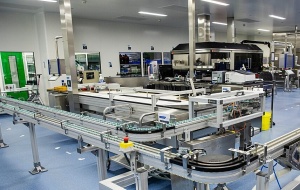Opening the domestic arena to pharma distribution
 |
| Dang Duc Anh, vice president, Central Institute for Economic Management |
The government has issued and updated many policies to encourage and create conditions for development of domestic production. Although these policies have helped increase production capacity and provision of some pharmaceutical distribution and logistics services, investment in this field is still relatively limited compared to the country’s potential.
Vietnam’s pharmaceutical market is not attractive to pharmaceutical investors, partly due to limitations and problems in foreign investment policies on investment protection and market opening. The domestic pharmaceutical market is not fully open in various aspects, including drug storage and transportation services. Vietnam is currently the only country in ASEAN that has not opened its doors to drug distribution services.
Restricting foreign-invested enterprises (FIEs) in pharmaceutical distribution and logistics has an impact on domestic enterprises in both positive and negative ways. On the positive side, current regulations help ensure space and development motivation for domestic businesses. In fact, a number of domestic enterprises have taken advantage of opportunities and built their brands in pharmaceutical distribution and logistics activities.
However, current regulations also limit opportunities for domestic businesses to cooperate and learn from FIEs. Besides this, current regulations also cause a number of compliance costs and consequences for both individuals and businesses.
Typically, the current imported drug supply chain has the participation of many components and intermediaries, which can be a reason for the increase in imported drug supply costs, greatly affecting drug prices. This can also make managing the source, origins, quality, and safety of drugs more difficult.
Developing the pharmaceutical industry on par with advanced countries in the region has been a policy that has been centrally directed by the party and state for years. Accordingly, the government has set specific goals aimed at improving both physical and mental health, stature, longevity, and quality of life of the Vietnamese people.
The 2021 approval of the development initiative for pharmaceuticals towards 2030 and beyond shows the current mindset on opening distribution activities.
The national strategy for the development of Vietnam’s pharmaceutical industry has the targets of ensuring timely and sufficient the supply of quality, safe and affordable drugs; addressing the repercussions of natural disasters, crises, and public health emergencies; and meeting socioeconomic development needs, while safeguarding drug security to meet the demands of national defence.
The strategy also targets developing a professional, modern, effective, and strictly managed drug production, distribution, and supply system, as well as improving the efficiency of drug supply and distribution of domestic enterprises in accordance with international commitments.
Meanwhile, it also sets the general goal of developing Vietnam’s pharmaceutical industry on par with advanced countries in the region, ensuring access to medicines at a reasonable cost; as well as improving research capacity and application of available technology to produce brand-name drugs with new and modern dosage forms.
To achieve the goals of developing the pharmaceutical industry, the strategy proposes a number of solution groups, including a group of solutions to promote the mobilisation of all resources of individuals and organisations at home and abroad to promote investment in research and development of domestic production of drugs and biological products.
These moves show the government’s acknowledgement of the role of foreign investment in the development of the domestic pharmaceutical industry.
The international experience of a number of countries with the advanced pharmaceutical industries shows that these countries have made good use of the resources of foreign investors to develop their local pharmaceutical industry through technology transfer activities, and developing high-quality human resources in pharmaceutical distribution, thus reducing drug costs.
As Vietnam has been focusing more on effectively implementing the international economic integration process, we find that it is necessary to have more friendly policy thinking to mobilise and create favourable for all economic sectors to participate in the production, logistics and distribution of pharmaceutical products in the domestic market, aiming to ensure the benefits of consumers, which is the highest and most important benefit.
 | The game-changers in pharmaceuticals Innovative pharmaceuticals are emerging as a game-changer reshaping the industry, which is urging Vietnamese authorities to have supporting policies to tap into new potential. |
What the stars mean:
★ Poor ★ ★ Promising ★★★ Good ★★★★ Very good ★★★★★ Exceptional
Themes: Healthcare Platform
- Hanoi intensifies airport monitoring amid Nipah disease risks
- Cosmetics rules set for overhaul under draft decree
- Policy obstacles being addressed in drug licensing and renewal
- Sanofi, Long Chau Pharmacy relaunch medicine blister pack collection initiative
- Takeda Vietnam awarded for ongoing support of Vietnam’s sustainability efforts
Related Contents
Latest News
More News
- State corporations poised to drive 2026 growth (February 03, 2026 | 13:58)
- Why high-tech talent will define Vietnam’s growth (February 02, 2026 | 10:47)
- FMCG resilience amid varying storms (February 02, 2026 | 10:00)
- Customs reforms strengthen business confidence, support trade growth (February 01, 2026 | 08:20)
- Vietnam and US to launch sixth trade negotiation round (January 30, 2026 | 15:19)
- Digital publishing emerges as key growth driver in Vietnam (January 30, 2026 | 10:59)
- EVN signs key contract for Tri An hydropower expansion (January 30, 2026 | 10:57)
- Vietnam to lead trade growth in ASEAN (January 29, 2026 | 15:08)
- Carlsberg Vietnam delivers Lunar New Year support in central region (January 28, 2026 | 17:19)
- TikTok penalised $35,000 in Vietnam for consumer protection violations (January 28, 2026 | 17:15)

 Tag:
Tag:




















 Mobile Version
Mobile Version